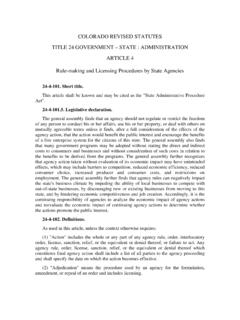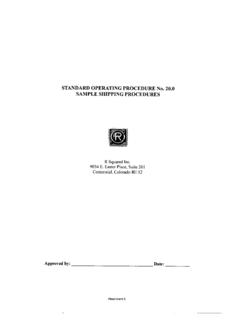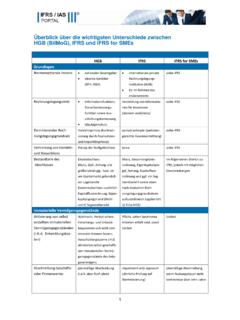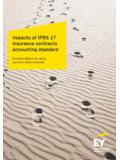Transcription of IAS 36 Impairment testing: practical issues
1 IAS 36 Impairment testing : practical issues Introduction Contents IAS 36 Impairment of Assets (the standard) sets out the procedures that entities must apply to ensure that their assets are carried at no Introduction 2 more than the amounts expected to be recovered through the use or sale of the assets. Executive summary 3. Although the main principles of IAS 36 are very clear, the practical testing for Impairment at the end application of IAS 36 has always been challenging and problems have of each reporting period 4. been brought into focus during the recent economic uncertainty. A special Impairment indicator: This publication discusses some of the main complexities for those market capitalisation 5. who want to better understand the requirements of IAS 36 and Allocating and reallocating goodwill 6 its practical consequences. It provides guidance on a range of application issues that have emerged as common problems across IAS 36 valuation issues 8.
2 A broad range of entities and industries. Goodwill Impairment disclosures 17. 2 IAS 36 Impairment testing : practical issues Executive summary Valuation issues . IAS 36 requires the recoverable amount of an asset or CGU to be measured as the higher of the asset's or The main issues addressed in more detail in this publication have CGU's Fair Value Less Costs to Sell (FVLCS) and Value in Use been summarised below: (VIU). Measuring the FVLCS and VIU of an asset or CGU. requires the use of assumptions and estimates. testing for Impairment at the end of each interim reporting period. All assets, including goodwill and intangible assets have The following issues are proving particularly troublesome: to be tested for Impairment at the end of each reporting period, The use of a discounted cash flow (DCF) methodology to if there are indicators of Impairment . Changes in circumstances estimate FVLCS. between the date of the Impairment test and the next reporting Determining the types of future cash flows that should be period end may give rise to Impairment indicators.
3 If so, more included in the measurement of VIU, in particular, those than one Impairment test may be required in an annual period. relating to restructuring programmes Market capitalisation as a special Impairment indicator. Some Determining the appropriate discount rate to apply entities have a market capitalisation that is lower than their net assets. Although this situation does not necessarily mean The impact of taxation on the Impairment test, given the that an entity has to write down its assets to the extent of the requirement in IAS 36 to measure VIU using pre-tax cash shortfall, it is a trigger to perform an Impairment test. flows and discount rates Allocating and reallocating goodwill to cash generating unit E. nsuring that the recoverable amount and carrying amount (CGU). Acquired goodwill is allocated to each of the acquirer's that are being compared are consistently determined CGUs, or to a group of CGUs, that are expected to benefit from The incorporation of corporate assets into the Impairment the synergies of the combination.
4 If CGUs are subsequently test revised or operations disposed of IAS 36 requires goodwill to Goodwill Impairment disclosures. Disclosure is not just a be reallocated, based on relative values, to the units affected. compliance exercise; it is a key communication to investors by management. Disclosures that describe the factors that could result in Impairment become even more important when the headroom has been eroded. IAS 36 Impairment testing : practical issues 3. testing for Impairment at the end The annual Impairment test Where an annual Impairment test is required for goodwill and of each reporting period certain other intangible assets, IAS 36 allows the Impairment test When does an Impairment test need to be performed? to be performed at any time during the period, provided it is performed at the same time every year. Different CGUs or groups Individual assets or CGUs need to be tested for Impairment (that of CGUs may be tested for Impairment at different times.)
5 Is, by estimating the recoverable amount): When there is an indication that the asset or CGU may be Many entities test goodwill at an interim period in the year. In impaired. Entities are required to consider at the end of each unstable times with high uncertainty, goodwill may have to be reporting period whether any indicators of potential tested for Impairment at year end and at a subsequent interim Impairment exist. reporting date as well, if indicators of Impairment arise after the The only exception is where there was sufficient headroom in annual test has been performed. a previous Impairment calculation that would not have been When a group of CGUs to which goodwill has been allocated is eroded by subsequent events or the asset or CGU is not tested for Impairment , there may also be an indication of sensitive to a particular indicator. Impairment of an asset or a CGU within the group. IAS 36 requires At least annually if the asset is, or the CGU contains, an the entity to test the asset or the CGU for Impairment first and to intangible asset with an indefinite useful life or an intangible recognise any Impairment loss on the asset or CGU before asset that is not yet available for use.
6 Carrying out the Impairment test for goodwill. In practice, this means that, in many situations, the Impairment test of the asset These assets or CGUs must also be tested for Impairment or CGU needs to be performed on the same date as the annual when there is an indicator of potential Impairment . goodwill Impairment test. At least annually when goodwill, acquired in a past business If an entity has to test for Impairment at the end of the reporting combination, has been allocated to the CGU or group of CGUs. date as well as at the scheduled annual date, it does not The only limited exception to this requirement applies where necessarily mean that the whole budget process needs to be there has been a business combination during the period and re-done, which would be a very time consuming process for most the entity was unable to complete the initial allocation of the entities. If updated bottom-up forecasts are not yet available, goodwill to CGUs or group of CGUs for Impairment purposes top-down adjustments may be sufficient to assess how much before the end of the period.
7 In such cases, IAS 36 does not headroom has been affected by changes in the period since the require the entity to provisionally allocate goodwill and latest (goodwill) Impairment review. perform an Impairment test on this provisional basis. Instead, the entity is allowed to disclose the unallocated amount. However, entities must be convinced that they really are unable to complete the allocation, especially when there are clear indicators of an Impairment . In many cases, it could be straightforward to perform a reliable allocation and Impairment test. 4 IAS 36 Impairment testing : practical issues A special Impairment indicator: What an entity has to do in response to this indicator depends very much on the specific facts and circumstances. Most entities market capitalisation cannot avoid examining their CGUs in these circumstances and may have to test goodwill for Impairment unless there was An Impairment test must be undertaken if there are indications of sufficient headroom in a previous Impairment calculation, Impairment .
8 Consequently, the identification of indicators of providing that the headroom has not been eroded by subsequent Impairment becomes a crucial stage in the process. events. Some assets or CGUs may not be sensitive to market IAS 36 provides guidance in the form of a list of internal and capitalisation as an indicator. external indicators of Impairment . It stresses that this list is the IAS 36 does not require a formal reconciliation between market minimum to be considered and that it is not exhaustive. capitalisation of the entity, FVLCS and VIU. However, entities One factor specifically noted by IAS 36 as an external indicator of need to be able to understand the reason for the shortfall. If the Impairment is that the carrying amount of the net assets of the recoverable amount exceeds market capitalisation, entities need entity exceeds its market capitalisation. to consider whether they have made sufficient disclosures to indicate why this is so as well as describing those factors that Market capitalisation is, potentially, a powerful indicator as, if it could result in Impairment in future periods.
9 Shows a lower figure than the book value of net assets, it inescapably suggests the market considers that the business is overvalued. However, the market may have taken account of factors other than the return that the entity is generating on its assets. An individual entity may have a high level of debt that the market doubts it will be able to service fully; a financial crisis may have led to a general collapse in market prices. A market capitalisation below book equity will not necessarily lead to an equivalent Impairment loss. IAS 36 Impairment testing : practical issues 5. Allocating and reallocating goodwill IAS 36 requires goodwill to be reallocated on the basis of relative values to the units affected, , to the revised CGUs or to the Acquired goodwill is allocated to each of the acquirer's CGUs, operations disposed of. or to a group of CGUs, that are expected to benefit from the If a CGU or group of CGUs is being reallocated to other CGUs synergies of the combination.
10 This is irrespective of whether other or group of CGUs as part of a reorganisation, then its goodwill assets or liabilities of the acquiree are assigned to those CGUs, or must be reallocated based on the relative value of those parts group of CGUs. that are to be integrated IAS 36 recognises that sometimes there is no basis for allocating For a disposal, goodwill is allocated between the operation goodwill to an individual CGU that is not arbitrary, so it permits disposed of (thereby affecting the gain or loss on disposal) and goodwill to be allocated to a group of CGUs. However, each CGU the portion of the CGU retained, based on their relative values or group of CGUs to which the goodwill is so allocated must: In both cases, the relative value approach is used unless the entity Represent the lowest level within the entity at which the can demonstrate that some other method better reflects the goodwill is monitored for internal management purposes goodwill associated with the reallocated operations or operations And disposed of.




